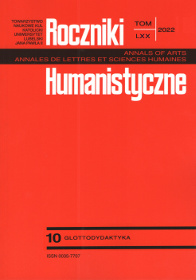Polish as Both a Typological Distant and Related Language—a Comparative Study of Learners’ Lexical Inference Strategies
Abstract
Polish is a less widely-learnt language. Recently, however, it has become attractive to many learners in Asia, who, whilst learning this typologically distant language in which nothing ‘looks or sounds familiar’, struggle with its grammar and vocabulary. This study examines lexical inference strategies used by Asian learners at B level in order to establish the meaning of unknown words, and compares them with those implemented by learners of Slavic origin for whom Polish is a closely related language. This study has let us establish what strategies the two group of learners employ most often; how the strategies employed by Asian students differ from those of Slavic ones, and what the difference is. The results have thus produced some interesting insight for pedagogic vocabulary practice. Lexical inference is an important way of enlarging learners’ mental lexicon.
References
Alderson, Charles J. „Reading in a Foreign Language. A Reading Problem or a Language Problem?” Reading in a Foreign Language, edited by Charles J. Alderson i Arthur H. Urquhart, Longman, 1984, ss. 1-24.
Bensoussan, Marsha, i Batia Laufer. „Lexical Guessing in Context in EFL Reading comprehension”. Journal of Research in Reading, nr 7, 1984, ss. 15-31.
Bernhardt Elisabeth. „Progress and Procrastination in second Language Reading”. Annual Review of Applied Linguistics, nr 25, 2005, ss. 133-50.
Cain, Kate, i in. „Individual Differences in the Inference of Word Meanings from Context: The Influence of Reading Comprehension, Vocabulary Knowledge, and Memory Capacity”. Journal of Educational Psychology, nr 96, 2004, ss. 671-81.
Carton, Aron S. „Inferencing, a Process of Using and Learning the Language”. The Psychology of Second Language Learning, edited by Paul E. Pimsleur i Terence E. Quinn, Cambridge University Press, 1971, ss. 45-58.
Cho, Kyung-Sook, i Stephen Krashen. „From Sweet Valley Kids to Harlequins in One Year”. California English, nr 1(1), 1995, ss. 18-19.
Chodkiewicz, Halina. „Szczególne miejsce czytania w nauce języka obcego”. JOwS, nr 4, 2016, ss. 79-85.
Chodkiewicz, Halina. Vocabulary Acquisition from the Written Context Inferring Word Meanings by Polish Learners of English. Wydawnictwo UMCS, 2010.
Coady, James, i in. The Teaching of Vocabulary in ESL from the Perspective of the Schema Theory, Midwest TESOL, 1985.
Comer, William J. „Lexical Inferencing in Reading L2 Russian”. Reading in a Foreign Language, vol. 24, nr 2, 2012, ss. 209-30.
Europejski system opisu kształcenia językowego; nauczanie, uczenie się, ocenianie, Wydawnictwo CODN, 2003.
Grabe, William. Reading in a Second Language: Moving from Theory to Practice. Cambridge University Press, 2009.
Gu, Peter Y. „Vocabulary Learning in a Second Language: Person, Task, Context and Strategies”. TESL-EJ, nr 7(2), 2003, ss. 1-28.
Haastrup, Kirsten. Lexical Inferencing Procedures or Talking about Words. Tübingen, 1991.
Hassanzadeh, Zahra, i in. „The Effect of Lexical Inference Strategy Instruction on Iranian EFL Learners’ Vocabulary Depth and Breadth”. Congent Education, t. 6, nr 1, 2019, ss. 1-16.
Hu, Marcella, i Hossein Nassaji. „Lexical Inferencing Strategies: The Case of Successful Versus Less Successful Inferencers”. System, nr 45, 2014, ss. 27-38.
Haynes, Margot. „Patterns and Perils of Guessing in Second Language Reading”. Second Language Reading and Vocabulary Learning, edited by Thomas Huckin, Margot Haynes, James Coady, Ablex Norwood, 1993, ss. 46-62.
Lexical Inferencing Strategy Use and Success”. The Canadian Modern Language Review, nr 61 (1), 2004, ss. 107-34.
Lipińska, Ewa. „Dwa w jednym – uczący się zróżnicowani pod względem umiejętności językowych”. Nauczanie języka polskiego jako obcego w grupach heterogenicznych, red. Ewa Lipińska, Anna Seretny, Księgarnia Akademicka, 2019, ss. 47-68.
Nassaji, Hossein. „The Relationship between Depth of Vocabulary Knowledge and L2 Learners
Nation, Paul. „The Language Learning Benefits of Extensive Reading”. The Language Teacher, nr 21(5), 1997, ss. 13-16.
Paribakht, Tima S., i Majorie Wesche. „Reading and “Incidental” L2 Vocabulary Acquisition: An Introspective Study of Lexical Inferencing”. Studies in Second Language Acquisition, nr 21, 1999, ss. 195-224.
Qian, David D. „Demystifying Lexical Inferencing: the Role of Aspects of Vocabulary Knowledge”. TESL Canada Journal, nr 22, 2005, ss. 34-54.
Schmitt, Norbert. „Vocabulary Learning Strategies”. Vocabulary: Description, Acquisition and Pedagogy, edited by Norbert Schmitt, and Michael Mccarthy, Cambridge University Press, 1997, ss. 199-227.
Scott, Judith A. „Creating Opportunities to Acquire New Word Meanings from Text”. Teaching and learning vocabulary: Bringing research to practice, edited by Elfreda H. Hiebert, Michael L. Kamil, Lawrence Erlbaum Associates, 2005, ss. 69-91.
Seretny, Anna. „Czytanie ekstensywne, czyli sposób na efektywne rozwijanie kompetencji leksykalnej uczących się”. Sztuka to rzemiosło. Nauczyć Polski i polskiego, red. Aleksandra Achtelik, Jolanta Tambor, Wydawnictwo Gnome, 2013, ss. 208-20.
Seretny, Anna. „W ciemnościach tunelu, czyli o zjawisku leksykalnego plateau”. Postscriptum Polonistyczne, nr 2, 2015, ss. 89-106.
Seretny, Anna. „Inferencja leksykalna – ważna strategia czytelnicza w języku obcym”. Kwartalnik Polonicum, nr 31/32, 2019, ss. 18-27.
Tavakoli, Mansoor, i Samira Hayati. „The Relationship between Lexical Inferencing Strategies and L2 Proficiency of Iranian EFL Learners”. Journal of Language Teaching and Research, t. 2, nr 6, 2011, ss. 1227-37.
Wang, Qiaoying. „Lexical Inferencing Strategies for Dealing with Unknown Words in Reading – a Contrastive Study between Filipino Graduate Students and Chinese Fraduate Students”. Journal of Language Teaching and Research, nr 2, 2011, ss. 302-13.
Waring, Rob. „Why Extensive Reading Should Be an Indispensable Part of All Language Programmes”. The Language Teacher, nr 30(7), 206, ss. 44-47.
Wesche, Majorie, i in „Research on the Lexical Inferencing Process and its Outcomes”. Lexical Kirsten Inferencing in a First and Second Language: Cross-linguistic Dimensions, edited by Majorie Wesche, Tima S. Paribakht, Multilingual Matters, 2010, ss. 3-31.
Copyright (c) 2022 Roczniki Humanistyczne

This work is licensed under a Creative Commons Attribution-NonCommercial-NoDerivatives 4.0 International License.





